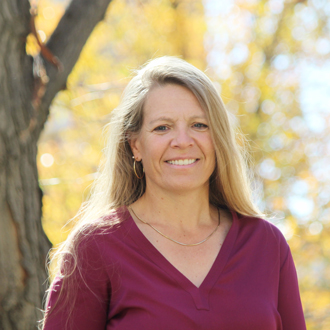Climate & Worker Health Targeted Research Training Program
Program overview
The Climate & Worker Health Targeted Research Training (TRT) program supports future leaders in the field of climate and workforce health by receiving high-quality education and research training in addressing the short- and long-term impacts of climate change on occupational health. The program emphasizes populations experiencing disparities in exposure and adaptation measures including rural, migrant and precariously employed, Black, Indigenous, and People of Color (BIPOC), Latino/a, and aging workforces.
The Climate & Worker Health TRT is a program run across two institutions: the Colorado School of Public Health at the University of Colorado and Colorado State University. The Mountain & Plains Education and Research Center (MAP ERC) financially supports qualified students in the program. The MAP ERC is one of 18 National Institute for Occupational Health and Safety (NIOSH) Education and Research Centers in the country.
Students supported by the center collaborate with trainees in ergonomics, occupational and environmental medicine, industrial hygiene, health physics programs, Total Worker Health® on interdisciplinary research, scholarly projects, and in-depth field assessments at local industry sites. Trainees in this program will join a forward-thinking faculty and student cohort to address one of the most urgent challenges we face today in public health.
Program Director & Associate Directors

Katherine James PhD, MS, MSPH
- Center for Health, Work & Environment
- Community Epidemiology & Program Evaluation
- Department of Environmental & Occupational Health
- Department of Epidemiology
Dr. James is an engineer and epidemiologist specializing in environmental and climate systems health effects of metals in the San Luis Valley and other areas of the Mountain West. She heads a large R01 study on the impact of drought on arsenic exposure and cardiometabolic outcomes in a rural aging population, alongside projects focusing on cadmium exposure, chronic kidney disease, and maternal arsenic exposure and adverse birth outcomes. Dr. James leads the MEMCARE Community Engagement Core, implementing interventions to reduce metal exposure in pediatric populations. With extensive experience in community-based human studies and a network she is actively involved in transdisciplinary research on the health effects of environmental heavy metal exposures, climate health and resilience. Currently spearheading multiple community-engaged research endeavors, including a NIH funded project on drought's impact on metals in drinking water and its cardiovascular consequences, her work emphasizes sustainable community engagement for climate health research and equity in rural and urban communities through initiatives like the Mountain West ACE-CH Hub.
Areas of Expertise
- Climate Health
- Metals Toxicity
- Rural Health
- Worker Exposure Assessment
- Mentoring students
Education, Licensure & Certifications
- PhD University of Colorado, Anschutz Medical Campus, Epidemiology, 2010
- MS University of Colorado, Boulder, Civil/Environmental Engineering, 2002
- MSPH University of Colorado, Health Sciences Center, Public Health, 2000
- BS Virginia Polytechnic Institute & State University, Biological Systems Engineering, 1996
Awards
- 2022: Faculty Award for Excellence in Research, Colorado School of Public Health
- 2022: Selected for the Climate Change, Health Equity, and Public Health Law Learning and Practice Collaborative
- 2021: Alpha Upsilon Chapter of the Delta Omega National Honorary Society in Public Health
- 2021: Selected Climate for Health Ambassadors Community, EcoAmerica
- 2019: Selected for the NIH/NSF sponsored Data Innovation Lab on Environmental Health in Rural Populations
- 2018: Dean’s International Travel Award Colorado School of Public Health
- 2013: Selected for the Early Career Women in Medicine Leadership Conference July 2013
- 2012: Faculty Development Award Children’s Environmental Health Center, National Jewish Hospital
- 2011: American Academy of Neurology Conference, Selected as a top abstract for presentation by the scientific chair, Dr. Stefan Pulst, in the “Scientific Program Highlights Plenary Session”.
- 2000: Awarded Travel Scholarship Royal Society Hygiene and Tropical Medicine to travel to the Republic of Mauritius for environmental research and training.
- 1998: Dennis Burkitt Fellowship, Royal Society of Tropical Medicine and Hygiene
Affiliations
- Member, International Society of Environmental Epidemiologists
- Member, Society of Toxicology
- Member, International Society of Exposure Science
- Member, CU Climate Consortium
Who should apply?
Current doctoral students in any year of their program from the following fields:
- Climate scientists
- Epidemiologists
- Statisticians
- Occupational safety and health experts
- Psychologists
- Public health professionals
- Laboratory researchers
Curriculum
Stipend
| PG Year | Stipend 2023-2024 |
| 1 | $2,196 |
| 2 | $2,196 |
*NRSA will publish new stipend amounts for the upcoming year in June 2023.
Frequently asked questions
Faculty
University of Colorado
- John Adgate, PhD, MSPH | Professor, EOH
- Alison Bauer, PhD | Associate Professor, EOH
- Jared Brown, PhD | Professor, Toxicology
- Elizabeth Carlton, PhD, MPH | Associate Professor, EOH
- James Crooks, PhD | Clinical Associate Professor, Epidemiology
- Katherin Dickenson, PhD | Associate Professor, EOH
- Diana Jaramillo, MPH | Research Instructor, EOH
- Kristopher Karnauskas, PhD | Associate Professor, EOH
- Lyndsay Krisher, MPH, DrPH| Research Assistant Professor, EOH
- Lisa Maier, MD, MSPH | Professor, School of Medicine, EOH, National Jewish Health
Colorado State University
- Ashley Anderson, PhD | Associate Professor, Journalism & Media Communications
- William Brazile, PhD, CIH | Associate Professor, Environmental & Radiological Health Sciences
- Jesse Burkhardt, PhD | Associate Professor, Agriculture and Resource Economics
- Ellison Carter, PhD | Assistant Professor, Civil & Environmental Engineering
- Gwenith Fisher, PhD | Associate Professor, Psychology
- Debbie Lee, PhD | Assistant Professor, Environmental & Radiological Health Sciences
- Christian L’Orange, PhD | Assistant Research Professor, Mechanical Engineering
- Luke Montrose, PhD | Assistant Professor, Environmental & Radiological Health Sciences
- Andreas Neophytou, ScD | Assistant Professor, Environmental & Radiological Health Sciences
- David Rojas-Rueda, MD, MPH, PhD | Assistant Professor, Epidemiology
- Joshua Schaeffer, PhD, MS, CIH | Associate Professor, Environmental & Radiological Health Sciences
- Ralph Sudowe, PhD | Professor, Environmental & Radiological Health Sciences
- Mike Van Dyke, PhD | Industrial Hygiene


